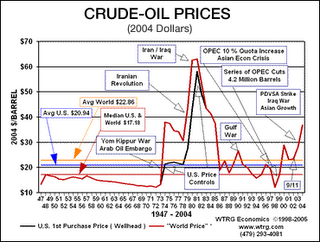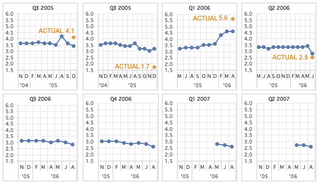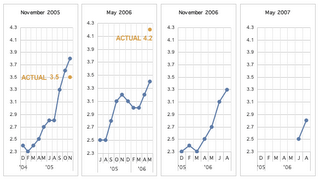Living in South Florida this time of year means thinking about hurricanes; so far this year I haven't had to think about much. We've had a couple of tropical storms come near us, but nothing even close to last year. Of course, I knew we wouldn't have any storms this year; my wife spent a small fortune on hurricane supplies at the beginning of the summer and that usually ensures a quiet season.
Last year was a terrible year for storms and naturally the public expected this year to be similar. Al Gore and the global warming crowd cite last year as evidence that climate change is causing more severe weather. I don't have any expertise in climate research, but I do watch the local weather every day. I can't figure out how people can believe that climatologists have figured out what the weather will be in 50 years when they can't tell me what it will be next week. I also happen to think humans are rather insignificant in the face of Mother Nature. I don't know if the hurricane season will produce a major storm this year; there's still a long way to go in the season and I'm furiously knocking on wood right now. But I do think the odds of a major storm are less this year because of the extreme activity last year. Here's some evidence that maybe Mother Nature is still on the ball:
"Hurricanes require warm sea surface temperatures (SSTs), and last year the tropical Atlantic sea surface temperatures were running well above normal. Global warming was the explanation given by most 'experts' the media interviewed. And since global warming will only get worse, those SSTs were expected to just keep on increasing.
But now those same regions that had anomalously warm SSTs last year are -- gasp! -- near normal.....
This is not the only surprisingly cool SST story. A new scientific article now accepted for publication in Geophysical Research Letters shows that the globally averaged upper ocean cooled dramatically between 2003 and 2005, effectively erasing 20% of the warming that occurred over the previous 48 years!
The rapidity of this observed temperature change is beyond what computerized climate models can explain. This is perplexing for modelers, who tend to believe that their models contain all of the important physics of the problem."
Read the rest via TCS So why, you might ask, is this post on an investment advisor's blog? Well, maybe it's time to consider the insurance sector. Since I don't buy that many individual stocks, I looked for an ETF that invests in insurance stocks. Our friends at Barclay's have one:
Dow Jones U.S. Insurance Index Fund (IAK)
The iShares Dow Jones U.S. Insurance Index Fund seeks investment results that correspond generally to the price and yield performance, before fees and expenses, of the Dow Jones U.S. Select Insurance Index.
This fund has 44% in property/casualty stocks, P/E of about 15, expense ratio of 0.48%. The only drawback is that 23% of the fund is in one stock, AIG.
Powershares has an insurance portfolio as well:
Symbol is PIC, P/E of about 12, expense ratio of 0.60%. It doesn't break down the portfolio into property/casualty insurers, but it is more diversified; the largest position is LNC (Lincoln National) at 5.43%. The Powershares portfolio is also one of the new fundamental indexes that is intended to outperform the more traditional capitalization weighted indexes.
Alhambra has not taken a position in either of these funds -- yet. We may or may not; it's just something we are considering at the moment. If we actually start buying, we'll let our blog readers know.








